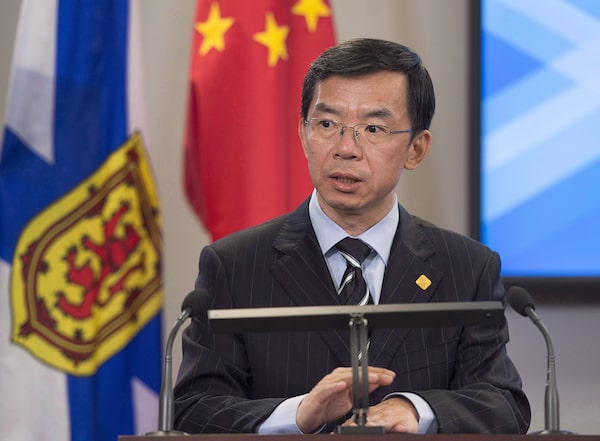
Chinese ambassador Lu Shaye addresses the media during a visit to Halifax on Nov. 7, 2017.Andrew Vaughan/The Canadian Press
Beijing’s envoy says it is “immoral” for Canadians to oppose takeovers of their companies by Chinese government-controlled businesses and is denouncing national security scrutiny of these acquisitions.
Chinese ambassador Lu Shaye levied these accusations earlier this week at a symposium on his country’s $1-trillion Belt and Road Initiative to build infrastructure across Asia and Africa and Europe – an event also featuring a senior Canadian government official from the department of Global Affairs.
Mr. Lu, speaking to an Ottawa audience, urged Canada to “adjust its mindset” and embrace the idea that Beijing’s state-owned enterprises are not a national security threat.
He added said it’s futile to “demonize” state-run businesses – which in some cases receive direct or indirect subsidies from Beijing – because they comprise such a significant feature of the Chinese economy.
“Some people in Canada regard Chinese-state owned enterprises as monsters,” Mr. Lu said. “These people attempt to weaken the competitiveness of Chinese enterprises by defamation. These approaches are immoral and will be in vain.”
National security agencies in both Canada and the United States have previously warned that companies owned or partly owned by the Chinese government are not merely profit-seeking operations, but are also prone to passing on information or technology to Beijing and taking business decisions that could conflict with Canadian interests and serve the agenda of the ruling Communist Party of China.
More than 30 Chinese state-owned enterprises listed on the Hong Kong stock exchange have added the Communist Party to their corporate structures over the past year, giving a formal governance role to the entity that heads China’s authoritarian state as President Xi Jinping seeks more influence over these firms.
Sarah Taylor, director-general of North Asia and Oceania at Global Affairs, shared the stage with Mr. Lu Tuesday night in Ottawa, but did not challenge or address the envoy’s toughly worded criticism.
Conservative foreign affairs critic Erin O’Toole said Ms. Taylor’s silence was reminiscent of what happened in 2016 when China’s visiting foreign minister publicly berated a Canadian journalist in front of then-foreign affairs minister Stéphane Dion.
Mr. O’Toole said he strongly objects to the ambassador’s criticism of Canadians who raise legitimate concerns about the activities of Chinese state-owned enterprises.
“These are not your typical multinational, large corporations. These are arms, in some cases, of the Chinese state and not only have they not been reforming them, they have actually been making Communist party members more of an integrated part of these enterprises,” he said.
A spokesman for Foreign Affairs Minister Chrystia Freeland declined to comment on Ms. Taylor’s conduct but defended Canada’s right to scrutinize foreign investment.
“Canada encourages investment in Canada, which provides good, well-paying jobs for the middle class and those working hard to join it,” press secretary Adam Austen said. “Of course, we take our national security very seriously and we will continue to conduct national security reviews of potential foreign investment to ensure that our interests are protected.”
Two former directors of the Canadian Security Intelligence Service, Richard Fadden and Ward Elcock, as well as former Canadian ambassador to China David Mulroney, are among prominent Canadians who have questioned takeovers by state-owned companies answerable to Beijing.
The Canadian government is currently conducting a national security review of the $1.5-billion acquisition of Toronto-based infrastructure firm Aecon Group by China Communications Construction Company, which is 63 per cent owned by the Chinese government.
Mr. Lu did not mention Aecon by name, but he said Canadians “need to adjust their mindset” and avoid creating barriers to Chinese investment in Canada.
He argued that China can be trusted and would only act in the best interests of Canada.
“China is not that formidable, and we never think about doing anything harmful to Canada,” Mr. Lu said. “We hope Canada could adjust its mindset and do not always see China through tinted glasses, nor create barriers for two countries’ co-operation at the excuse of national security.”
The ambassador also criticized the media for reporting on Canadian parliamentarians who have accepted free trips to China paid for by Chinese government or Beijing-friendly groups and meeting with agents of the Communist Party.
The Globe and Mail reported in early December that parliamentarians have taken 36 trips to China sponsored by China or business groups seeking closer ties and trade with the one-party state.
A senior Canadian official said these Globe stories were repeatedly raised by Chinese officials during Prime Minister Justin Trudeau’s official visit to Beijing in late December. Chinese officials scolded the Trudeau government for not stopping The Globe from reporting on these Chinese-funded parliamentary junkets. The Canadian official said Chinese authorities did not seem to understand that the government can’t limit media reporting the way it can be controlled in China.
Ms. Taylor, who spoke after the ambassador’s speech and later sat on a panel with Mr. Lu, did not defend Canada’s national security review process or challenge the ambassador’s view that Chinese state-owned enterprises were being demonized.
She used her speech to pitch the benefits of having Canadian companies benefit from China’s Belt and Road Initiative, which has been criticized by Western countries. Germany’s Handelsblatt reported this week that 27 European Union-country ambassadors to Beijing have compiled a report that sharply criticizes China’s “Silk Road” project, denouncing it as designed to hamper free trade and put Chinese companies at an advantage.
Beijing is pouring US$1-trillion into building railways, ports and pipelines in what many experts regard as a state-directed effort to bolster Chinese political influence and extend its military reach from Asia to Africa.
Although Canada has not officially endorsed the Chinese plan, Ms. Taylor said Canadian companies have the skills to work on many of these infrastructure projects.
 Robert Fife
Robert Fife Steven Chase
Steven Chase